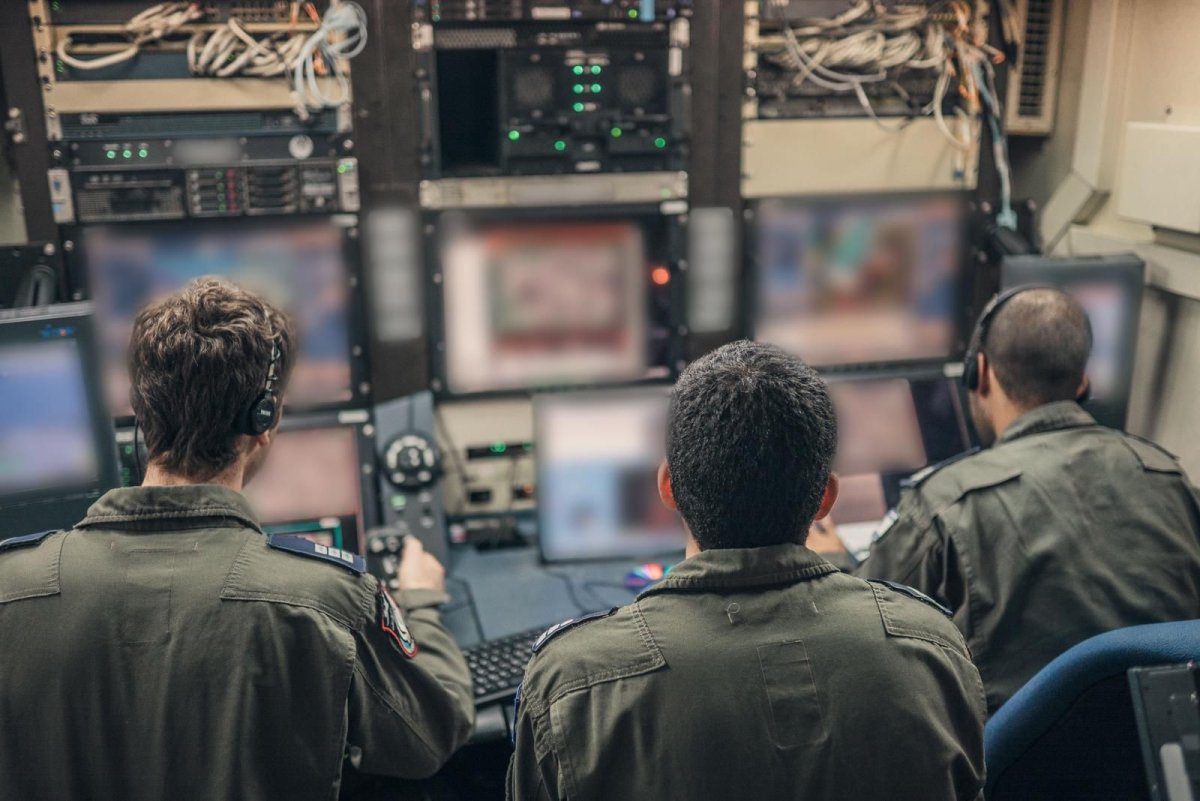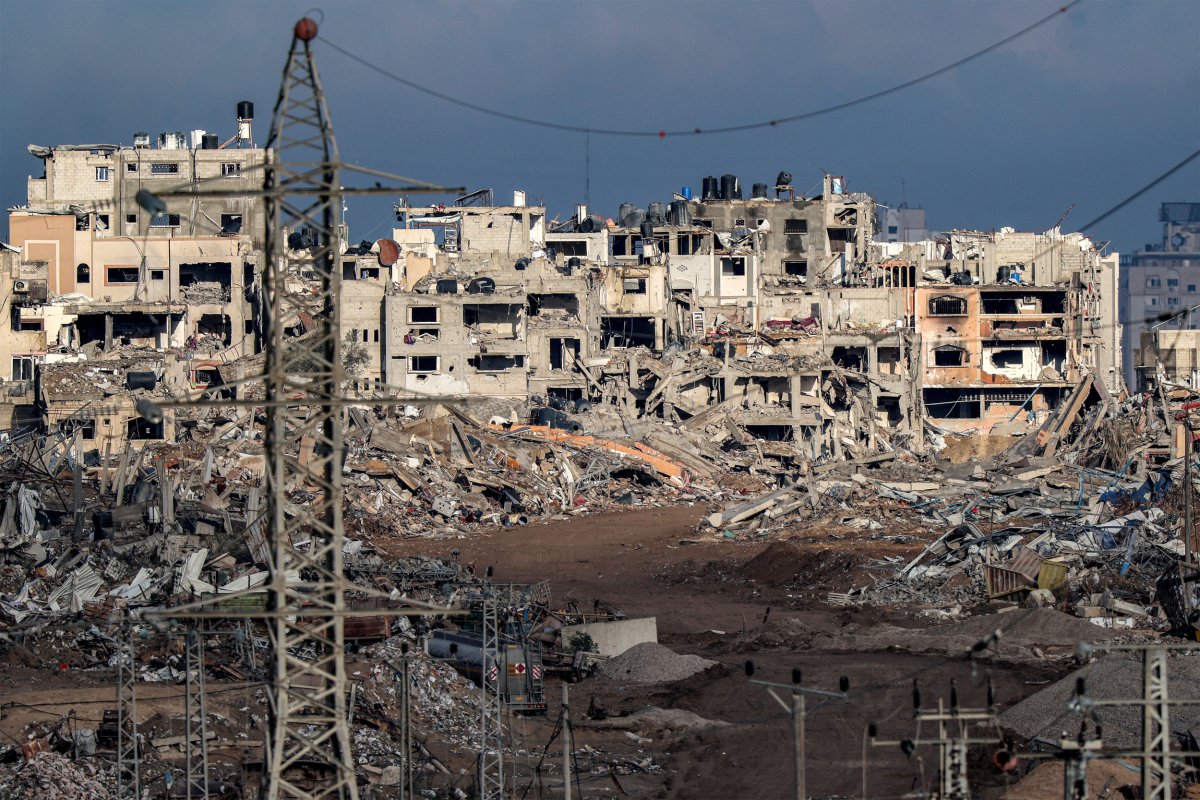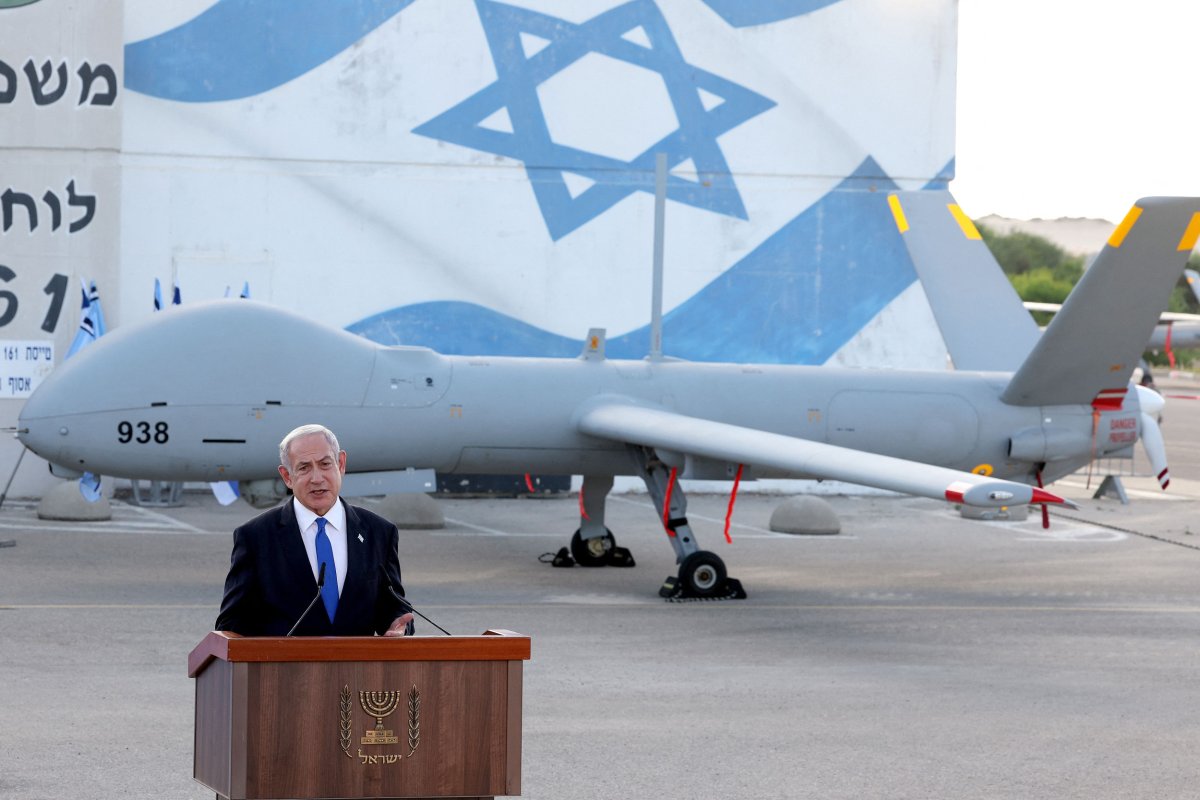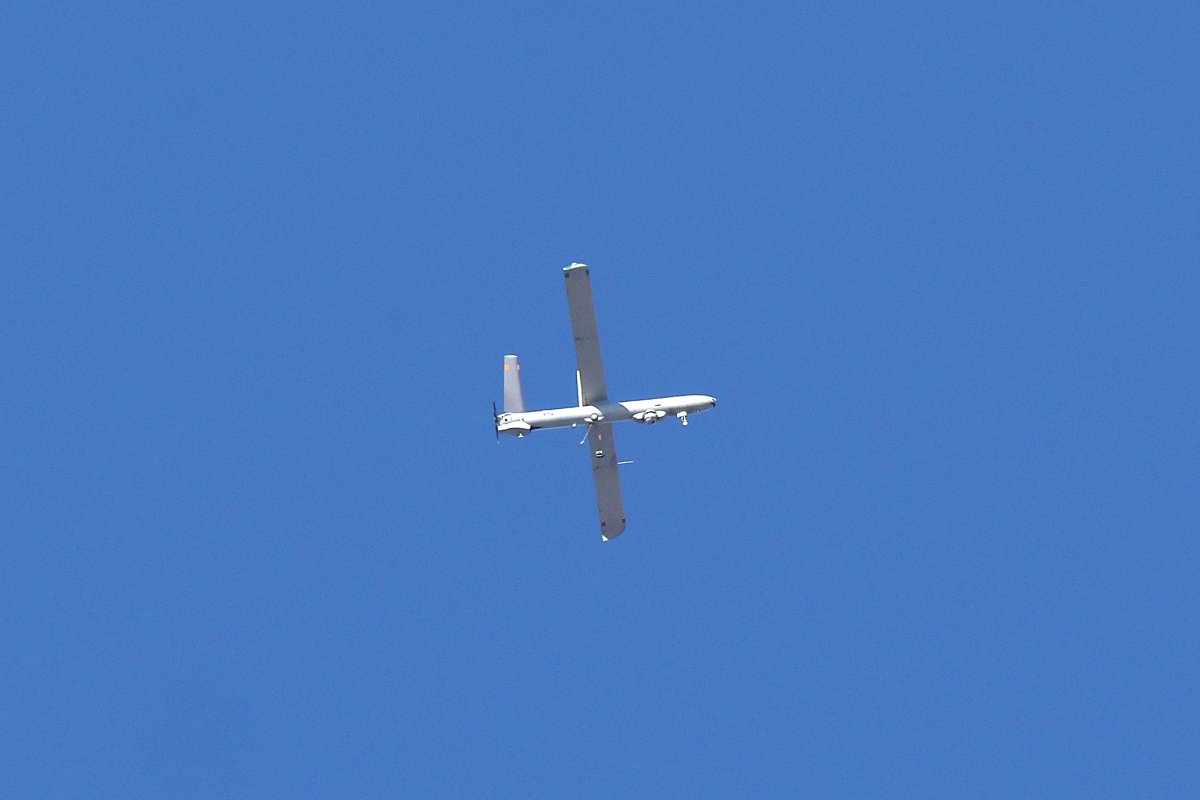Tom O'Connor
As Israeli troops continue to wage war by land in the Hamas-held Gaza Strip, Israel Defense Forces (IDF) operators tucked into command rooms away from the frontlines are leading a parallel campaign from above.
At any given time, according to one IDF drone operator who requested to be identified simply as Captain D., up to dozens of Israeli unmanned aerial vehicles (UAVs), mostly models of the domestically produced Elbit Hermes system, are hovering over the skies of Gaza prepared to launch strikes against targets pre-planned or spontaneous.
"They are the choice weapon for accurate, legal strikes," Captain D. told Newsweek.
And yet, even with an IDF legal department issuing guidance throughout the campaign, Israel's air war continues to come under growing international scrutiny. This criticism has been fueled by reports of increasing civilian casualties amid a death toll reported by the Gaza-based Palestinian Health Ministry to have exceeded 23,000 people, mostly women and children, since the conflict began with Hamas' October 7 surprise attack.
One IDF legal adviser who requested anonymity acknowledged to Newsweek that the number of civilian casualties was very high. However, they argued that Israeli forces continue to go to lengths to mitigate civilian harm in line with international law while Hamas intentionally put Palestinian non-combatants in harm's way—an allegation the group vehemently denies.
Captain D. also blamed Hamas, which he asserted ultimately benefitted from the death of civilians at the hands of Israel.
The latest news on the Israeli-Palestinian conflict.
"If I hear that a civilian has gotten hit, my immediate response is that [Hamas] got the upper hand; they succeeded in their mission," Captain D. said. "They got me to mess up and strike a civilian because for them it's as far as saying it's good news, they want more martyrs."
 IDF personnel operate in a drone command and control room in Israel. Drones "are the choice weapon for accurate, legal strikes," an IDF drone operator says.ISRAEL DEFENSE FORCES
IDF personnel operate in a drone command and control room in Israel. Drones "are the choice weapon for accurate, legal strikes," an IDF drone operator says.ISRAEL DEFENSE FORCESAs debates over ethics and legalities play out in political circles, however, Captain D. and his fellow operators continue to go to work each day and execute their missions.
Though the prospect of drone warfare is one of remote operations, Israel's size and exposure do not allow for the kind of distance afforded to counterpart programs in the United States or other major powers. Captain D. described the front as just 30 minutes away from his base, a journey he said he often makes to meet with soldiers in the field.
"When we're driving to base, we have our lives, we have our worries, we have friends who were kidnapped, friends who were killed," Captain D. said. But "as soon as we step into base," he explained, "it's a shift in mood."
"This is who I am. This is my mission. This is what I'm doing, in a very general sense," he said. "You talk to your buddies in the squadron. Everything is very focused, especially when you go into the brief."
Upon entering the briefing room, updates are provided on daily changes in operational conditions since the last mission was flown, according to Captain D. Topics include "how many civilians are there, how careful do we need to be in working in the north or in the south."
Next, operators break off into three-person units to prepare for the day before stepping into the control center, where missions are ultimately carried out. An operator seated to the right would operate the camera and, if approved, conduct strikes. To his left is the mission commander in constant communication with headquarters and intelligence on the task at hand.
Captain D. can find himself in either of these seats. A third crew member is also present to monitor the process and provides an extra set of eyes and ears to be utilized.
"Once the approval to fire is given, it's deadly silent," Captain D. said. "Everybody's focused on the strike and, at each and every given second, each and every one of these people on the communications can say abort the strike, and we abort the strike."
Calls to abort strikes are not uncommon, according to Captain D., and when they come in, he said, "It's very unfortunate."
"And I'll tell you why, not because we're not hitting civilians, obviously, but because Hamas is cynically using, in one of the worst ways possible, civilians and kids," Captain D. said. "When you see a terrorist holding an RPG (rocket-propelled grenade) on his shoulder and holding a kid's hand because he knows we're not going to strike him, that's what keeps you up at night."
 A view of buildings destroyed by Israeli bombardment in the Gaza Strip on January 3, 2024. The IDF has struck Gaza with fighter jets, warships at sea and tanks and artillery on land.JACK GUEZ/AFP/GETTY IMAGES
A view of buildings destroyed by Israeli bombardment in the Gaza Strip on January 3, 2024. The IDF has struck Gaza with fighter jets, warships at sea and tanks and artillery on land.JACK GUEZ/AFP/GETTY IMAGESThe View From the Ground
Palestinians have pushed back against the image of the IDF as a model for humanitarian concern in carrying out combat operations in Gaza. Members of Hamas and Palestinian emergency services alike have accused Israel of deliberately targeting civilians, along with protected sites such as hospitals and shelters, places the IDF alleges are used by Hamas to embed military infrastructure.
Ghazi Hamad, a senior member and spokesperson of Hamas, dismissed the Israeli narrative as "nonsense and lies."
"It has never been proven that Hamas used civilians as human shields or put their lives in danger because this is contrary to our faith and morals," Hamad told Newsweek. "We are working to protect our people and liberate them from occupation, and we want to create a future for them, so how do we expose them to danger?"
"On the other hand, Israel kills civilians without restrictions," Hamad added. "It killed 23,000 civilians, including 10,000 children, 7,000 women, 108 journalists and 63 medical staff, and killed more than 100 United Nations employees. Israel kills anything in the Gaza Strip and directs its anger at civilians because it did not achieve any military objectives and did not free a single Israeli prisoner."
With the fog of war yet to lift from the still-raging battlefield, U.N. officials have opened investigations into potential war crimes committed by both sides of the conflict. But a lack of access and cooperation amid the ongoing war will likely hamper any international probe for some time.
Like many in Israel, the IDF legal adviser with whom Newsweek spoke saw no equivocation between the approaches of Israeli forces and Hamas' Al-Qassam Brigades fighters when it comes to protecting civilians. Hamas also stands accused of committing mass atrocities in the initial October 7 attack in which around 1,200 people, mostly civilians, were killed and more than 240 taken hostage, according to Israeli authorities.
While many of those seized by Hamas and allied Palestinian factions have been returned through carefully negotiated deals mediated by Qatar and Egypt, more than 100 people are still believed to be held captive. It's unknown how many are still alive, however, as Hamas has blamed IDF strikes for killing the people it set out to save in Gaza.
For Hamad, the safe return of hostages is a testament to the group's commitment to preserving human life.
"See how the Al-Qassam Brigades dealt with the Israeli prisoners, treating them with respect while the occupation forces destroyed homes and towers over the heads of innocent residents," Hamad said. "I tell you clearly that no one today can deny that Israel is committing war crimes and genocide in Gaza and is practicing ethnic cleansing and forced displacement of the population, and even starving them."
 Israeli Prime Minister Benjamin Netanyahu stands near an Elbit Hermes 900 drone at the Palmachim Airbase on July 5, 2023. Just three months later, Hamas would launch a surprise attack on Israel.JACK GUEZ/AFP/GETTY IMAGES
Israeli Prime Minister Benjamin Netanyahu stands near an Elbit Hermes 900 drone at the Palmachim Airbase on July 5, 2023. Just three months later, Hamas would launch a surprise attack on Israel.JACK GUEZ/AFP/GETTY IMAGESLethal But Legal
The IDF's counter to this is a network of lawyers mobilized to advise on operations in real-time. The IDF legal adviser with whom Newsweek spoke estimated that there are more than 100 legal personnel currently active, many of them professional lawyers called into the reserves due to the country's wartime footing. The network is led by the IDF Military Advocate General's Corps, which is independent of the chief of staff in charge of operations.
Much of this advice is carried out over the phone, with each IDF brigade assigned a legal expert who then communicates with the brigade commander. Legal personnel are assigned to the IDF Southern Command tasked with Gaza, as well as the Northern Command currently embroiled in a deepening conflict with Lebanon's Hezbollah movement.
While not officially claimed by Israel, separate drone strikes widely attributed to the IDF killed two senior officials of both Hamas and Hezbollah in Lebanon over the past week. The attacks potentially mark the opening of a new chapter in the war as the IDF begins to reduce its ground presence in Gaza amid U.S. pressure to transition to a "more precise, more surgical" phase of the conflict.
When it comes to pre-planned IDF drone strikes, intelligence is first drawn up based on what the IDF legal adviser told Newsweek were protocols that the IDF legal department helped to establish in the first place. After a target is deemed a legitimate military threat, it's up to the weapons experts, the operational leader and the legal adviser to deliberate on carrying out the attack.
For real-time targets, of which the IDF legal adviser said there are many given the fluid circumstances of the conflict, the process moves much quicker, though units were still expected to follow protocols related to the principles of distinction and proportionality.
The legal adviser argued that the IDF only directs lethal force against combatants or those posing an immediate threat and challenged the notion that Israeli forces considered any military-age male to be a target, much less women and children.
But things do go wrong. If a particularly high number of civilian casualties is reported, the case is reviewed by a General Staff Mechanism for Fact-Finding Assessment, another independent body that may then recommend an investigation be opened by the Military Advocate General's Corps.
 An IDF Elbit Hermes drone flies over Gaza on January 10, 2024.JACK GUEZ/AFP/GETTY IMAGES
An IDF Elbit Hermes drone flies over Gaza on January 10, 2024.JACK GUEZ/AFP/GETTY IMAGESRewriting the Rules
Captain D., the IDF drone operator, said this system gives him "a lot of confidence" to carry out his work, assured that he was operating within the parameters of international law.
Still, he noted how the reality of the conflict has forced the IDF to shift some of its standard operating procedures, both as a result of what he said was "new technology emerging both on our side and the red side," as well as new directives coming in response to concerns over the civilian death toll.
"A lot of the standards and procedures have changed because Hamas is getting better and better at using the civilians around them," Captain D. said, "and we have to get better and better."
Specifically, he said drone strikes no longer target ambulances, even if operators can readily spot combatants using them for military purposes, "because we're just taking that extra mile to prevent huge civilian casualties."
"At the end of the day, this is war, and it's chaotic, and we're doing our absolute best," Captain D. said. "That's why we're using more unmanned aerial vehicles; that's why we're using more precision."
No comments:
Post a Comment